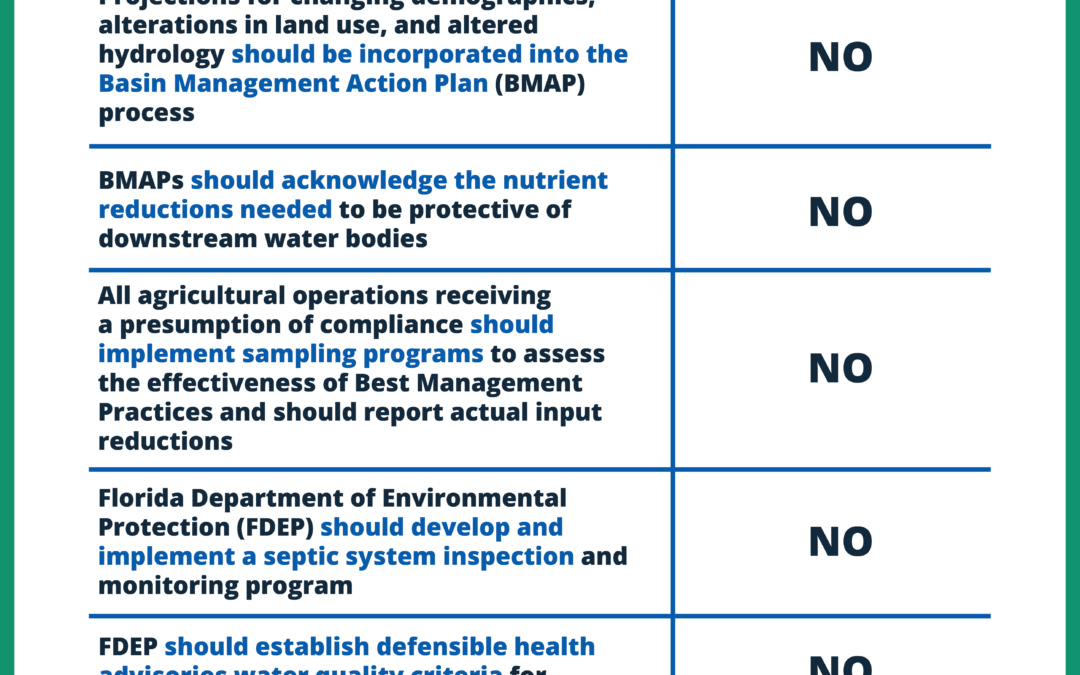Governor DeSantis recently signed into law SB 712 – the self-proclaimed “Clean Waterways Act”. However, the bill falls far short of resolving Florida’s mounting water quality problems.
Supporters praise the bill as one of the most environmentally progressive pieces of legislation in over a decade. However, the incremental changes just enacted don’t even get us back to where we were before the previous administration dramatically cut and rolled back many of our state’s environmental protections. At 111 pages, the bill lacks the specificity and enforceability to actually resolve or reduce major sources of pollution.
Even the common sense, albeit vague, recommendations of the Governor’s Blue Green Algae Task Force were not implemented with SB 712. For example, the Task Force recommended that projected changes in demographics, land use, and hydrology should be incorporated into pollution reduction plans (or BMAPs) for impaired waterways.
With 1,000 people moving to our state every day, millions of people will have made their homes here during the 20-year life of a BMAP, adding additional strain to our already-stressed natural resources. So, BMAPs are essentially out of date the day they are enacted and are destined to fail, since they don’t include projected changes that will likely occur. Unfortunately, SB 712 ignores the common sense recommendations and doubles down on the ineffective BMAP system that has contributed to the water quality crisis that we are experiencing today.
Furthermore, the bill fails to meaningfully address one of the largest sources of nutrient pollution in our state – agriculture. The Task Force recommended that agricultural Best Management Plans (BMPs) should be supported by actual data to justify the presumption of compliance with water quality standards. But, SB 712 only increases monitoring, not data or science, for current BMPs that have proven to be ineffective at curbing water quality pollution.
With regard to public health, SB 712 also ignored the Task Force recommendation for defensible health advisories and water quality criteria to inform the public about the potential health risks associated with exposure to toxic algae.
While SB 712 does initiate rulemaking to address things like septic systems, biosolids, and stormwater runoff, the effectiveness of these protections rely entirely on the specifics of the rules that will be drafted and hopefully adopted in the future. History has proven that this process favors polluting industries.
Subject to future appropriations, failed regulatory tools and studies that will kick the can down the road indefinitely, SB 712 does not live up to its title.
If that were not bad enough, a late-stage amendment preempts local governments from passing Rights of Nature regulations, a growing international movement that recognizes species and ecosystems with rights that could be protected in a court of law.
Despite months of advocacy and proposed amendments by Waterkeepers Florida, Sierra Club Florida, and Florida Springs Council, SB 712 falls far short of the measures needed to halt and reverse the decline of our state’s waterways.
We no longer have the luxury of taking incremental steps to address our water quality issues. We need strong, enforceable, science-based regulations that protect our waters now. Unfortunately, SB 712 does not accomplish that objective.
Letter to the Editor submitted on behalf of Waterkeepers Florida
Waterkeepers Florida is a regional entity composed of all 13 Waterkeeper organizations working in the State of Florida to protect and restore our water resources across over 45,000 square miles of watershed, which is home to over 15 million Floridians. For more information visit: www.WaterkeepersFlorida.org
